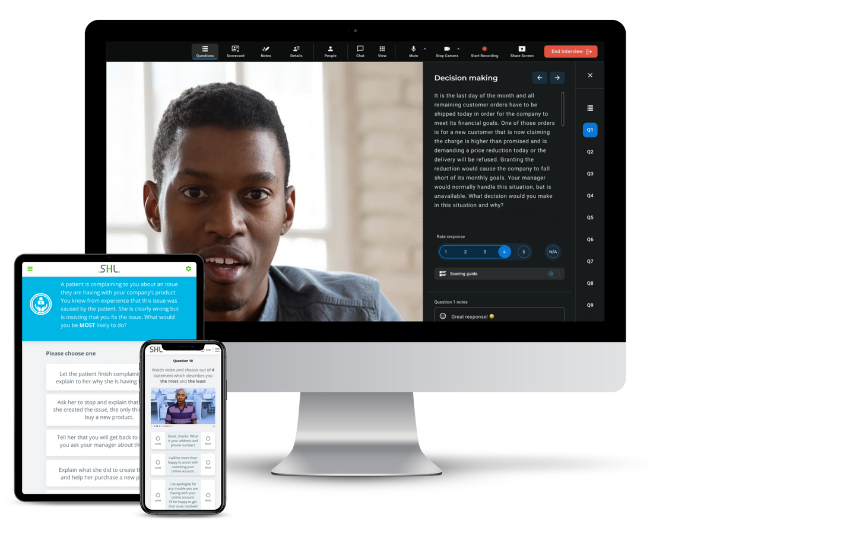Assessment Methods
Resume and Application Form
Employers will look for a match between your experience and qualifications and the requirements of the job. Remember that interviewers are likely to ask you questions based on the information you have included in your resume, so it is essential to be relevant, honest, and succinct. Remember that potential employers may have many resumés to read through and will often check the accuracy of the information you provide.
Ability Tests
Ability tests look at the extent to which you are able to carry out various aspects of a job; for example, your verbal reasoning and numerical reasoning abilities. Often employers are interested in your potential to do a task. In this case, they may use assessment methods that aim to simulate aspects of that task.
Personality Questionnaires
Personality Questionnaires look at behavioral preferences, that is, how you like to work. They are not concerned with your abilities but how you see yourself in terms of your personality; for example, the way you relate to others, and how you deal with feelings and emotions. There are no rights or wrongs in behavioral style, although some behaviors may be more or less appropriate to certain situations.
Situational Judgment Tests
Situational judgment tests are used to assess your ability to choose the most appropriate action in workplace situations. They involve reading a scenario or watching an animation and selecting the response that most effectively deals with the situation. These assessments are designed to assess how you would handle situations that you could encounter in the job you are applying for.
Assessment Center Exercises
During an assessment, a group of candidates takes part in a range of exercises, which are observed by assessors. The assessors rate the performance of the candidates against the competencies required for the job. Assessment Center Exercises can be delivered face-to-face or using a virtual assessment center platform, during which the exercises are completed digitally.
Interviews
Questions are likely to be based on your experience as well as the job competencies and requirements that should have been detailed in the job description. The key is to remember to be honest and to use relevant examples from your career, studies, or private life that provide evidence to the interviewers of any skills being discussed.
Recruitment Process Tips
Spend some time carefully evaluating whether the job is really suitable for you by asking yourself the following questions:
- What are the demands and rewards offered by the job?
- What does the job offer me in terms of my career prospects and interests?
- When I look at the organization, do I feel comfortable with its values and image?
- Apply in the format requested by the company (e.g. application form or resume).
- Follow the instructions carefully.
- Include any information specifically asked for.
- Make your achievements and skills clear; this is not a place for modesty.
- Draw up a list of your strengths and areas for improvement in relation to the job.
- Ensure that you can describe yourself and your experiences in and out of work. Be prepared to give examples.
If you have special requirements, make sure the employer understands these as early as possible.
- Make sure you understand what assessments you will be taking and what they will tell the employer about your fit for the job.
- Prepare yourself fully using the resources on this website. Familiarization with the different types of questions and timing of the tests will help you feel more relaxed in the real assessment situation, giving you a better opportunity to show your true ability.
- Think through what your strengths and areas for improvement are; this will be important for the interview.
- If you consider yourself as having a disability, make sure your recruiter is aware of it so he or she can discuss any possible adjustments to the assessments with you. The SHL Talent Measurement Solutions team is committed to supporting candidates with disabilities.
- When completing assessments online, read through the instructions carefully and complete any practice and example questions you are provided with.
- When doing face-to-face exercises assessors will be looking at how you perform on the exercises themselves, rather than how well you understand the instructions, so listen carefully to the instructions you are given. Don't be afraid to ask if you are unsure about what you have to do.
- Don’t make assumptions about how you should respond. If you try to guess what the assessors are looking for you may be wrong. It is best to be yourself, and respond honestly. Remember that it’s not in your interest to take a job to which you are not well suited.
- If the assessment involves interviews, team exercises, or role-playing, pay attention to your non-verbal communication such as eye contact, facial expression, and gestures.
- If there is more than one exercise, you will have other opportunities to show what you can do. If you feel you have performed poorly on one exercise don’t give up. Your performance across all of them will be taken into account.
Many organizations will offer you feedback, regardless of your success. This may give you an insight into your strengths and areas for improvement as well as your future development. If feedback is not offered, ask if it can be made available.
Try a Test
Take a full-length practice test to help prepare for an upcoming assessment.

